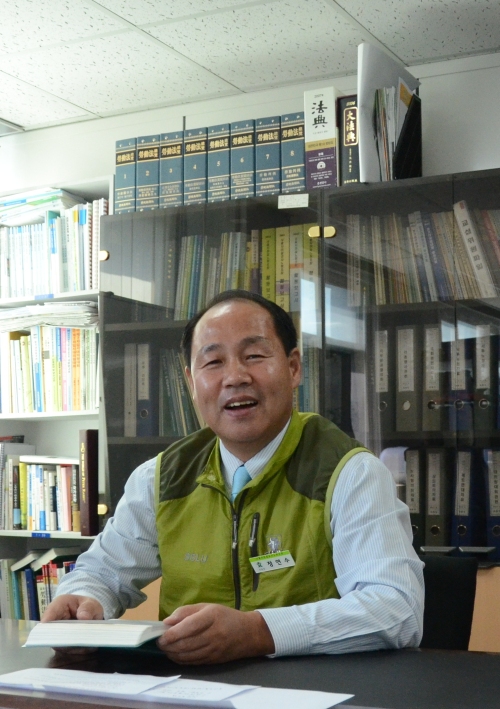Third umbrella union to launch Tuesday, vowing ‘no politics,’ more benefits
Korea’s labor unions had their day.
With violent strikes and street protests, they made contributions to advancing democracy and improving labor rights in the 1970s and 1980s. But those days are gone. What unions need to do now is to break away from their stereotypical militant showdowns with police and find a new way to address their issues, said Jung Yeon-soo who leads a movement to launch a new umbrella organization.
“We must wake up to the reality: Eighty percent of the general public disapproves of the labor movement as it is now,” he recently told The Korea Herald, citing a poll conducted years ago. “We must reform our labor movement to regain the public trust, or we’ll fail.”
On Nov. 1, Jung will launch a new labor organization, tentatively named the Korean Trade Unions Confederation. The 56-year-old head of a committee to prepare for the launch will serve as its inaugural chairman.
The envisioned KTUC would be the third umbrella group after the Federation of Korean Trade Unions and the smaller Korean Confederation of Trade Unions.
“We plan to register with the Labor Ministry on Nov. 2, a day after the inaugural ceremony,” Jung said.
So far, about 100 trade unions, including Seoul Metro, a union of provincial government workers and a teachers’ union, have pledged to join the new body.
Having been involved in the union movement since 1987, Jung believes that he can bring more substantial benefits to workers through dialogue with the management than through confrontations.
Korea’s labor unions had their day.
With violent strikes and street protests, they made contributions to advancing democracy and improving labor rights in the 1970s and 1980s. But those days are gone. What unions need to do now is to break away from their stereotypical militant showdowns with police and find a new way to address their issues, said Jung Yeon-soo who leads a movement to launch a new umbrella organization.
“We must wake up to the reality: Eighty percent of the general public disapproves of the labor movement as it is now,” he recently told The Korea Herald, citing a poll conducted years ago. “We must reform our labor movement to regain the public trust, or we’ll fail.”
On Nov. 1, Jung will launch a new labor organization, tentatively named the Korean Trade Unions Confederation. The 56-year-old head of a committee to prepare for the launch will serve as its inaugural chairman.
The envisioned KTUC would be the third umbrella group after the Federation of Korean Trade Unions and the smaller Korean Confederation of Trade Unions.
“We plan to register with the Labor Ministry on Nov. 2, a day after the inaugural ceremony,” Jung said.
So far, about 100 trade unions, including Seoul Metro, a union of provincial government workers and a teachers’ union, have pledged to join the new body.
Having been involved in the union movement since 1987, Jung believes that he can bring more substantial benefits to workers through dialogue with the management than through confrontations.

Jung is a third-term leader of Seoul Metro labor union, which was once one of the most militant unions in Korea. It stopped subway operation several times to realize their demands for higher wages and better working conditions, often inviting strong backlash from the public.
Under his stewardship, however, the labor union ended its militant protests and embraced a culture of dialogue.
“Through talks with the management, Seoul Metro was able to overcome a crisis after a financial crisis in 2008 without a major layoff,” he said.
In 2009 and 2010, Seoul Metro’s labor union signed a social pact with the Seoul Metropolitan Government and the Ministry of Public Administration and Security as well as the management, in a bid to find a win-win solution for all.
The KTUC aims to spread the culture of dialogue to other trade unions, while seeking democracy and transparency within the organization.
He also knows too well how corrupt some labor unions are and how selfish they can be when their vested interest is under threat.
“Unions exist for ordinary workers, not for union leaders. I’ll focus on issues facing ordinary workers in their daily life to deliver more benefits to them, while refraining from engaging in some random political controversies,” he said.
Jung expects the KTUC’s membership to swell greatly over the next two to three years.
Yet, he doesn’t intend to steal members from the existing FKTU or KCTU.
“What I want to do is to give a voice to those unrepresented or underrepresented workers. I don’t target those well-off workers at large corporations who belong to powerful unions.”
Nearly 90 percent of workers in Korea do not belong to unions, particularly those in non-regular types of employment.
“There is much to be done for non-regular workers, who endure lower pay and discrimination in the workplace.”
It will be a tough undertaking. An indication of how tough the task will be, Jung is facing resistance from within Seoul Metro.
Last week, a Seoul court ruled in favor of Jung’s rivals in the subway operator, invalidating the union’s decision to leave the KCTU. In a vote last April, 51 percent of union members approved the plan to go independent, a step necessary to join Jung’s new umbrella body. The court ruled, however, a two-thirds majority is required for any change of affiliation.
Unfortunately this is not the first time. In 2009, Jung failed in his efforts to have the union leave the KCTU.
By Lee Sun-young (milaya@heraldcorp.com)
-
Articles by Korea Herald









![[Kim Seong-kon] Democracy and the future of South Korea](http://res.heraldm.com/phpwas/restmb_idxmake.php?idx=644&simg=/content/image/2024/04/16/20240416050802_0.jpg&u=)









![[Today’s K-pop] Zico drops snippet of collaboration with Jennie](http://res.heraldm.com/phpwas/restmb_idxmake.php?idx=642&simg=/content/image/2024/04/18/20240418050702_0.jpg&u=)